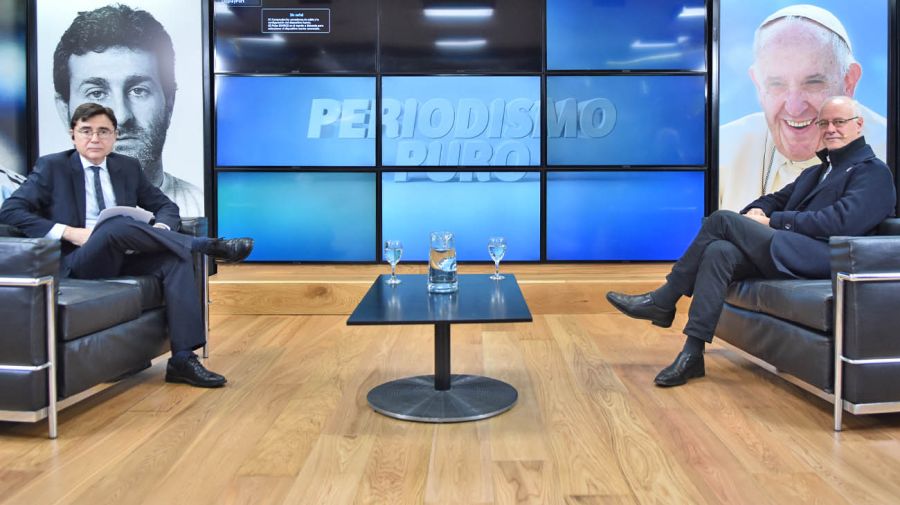For most of the coronavirus pandemic, all major decision-making was preceded by triangular consultations between the National, Buenos Aires Province and Buenos Aires City governments, each with their own angle on the problems.
Over the past fortnight, we have carried interviews with National Health Minister Carla Vizzotti and her City Hall counterpart Fernán Quirós. Today, Buenos Aires Province’s Daniel Gollán rounds off this series of interviews.
---
Buenos Aires Province Health Minister Daniel Gollán says all other debates should be postponed in order to work together in the face of the pandemic. He explains the logic behind the restrictions proposed by the provincial government. In his eyes the possibility of opening up activities this winter will essentially depend on lowering contagion and advancing with vaccination. In a feature-length interview, the 65-year-old provides details of the negotiations with various labs and relates how his Ministry informed the national government in mid-2020 that the Sputnik vaccine "had potential."
Did the quarantine around Villa Azul in mid-2020 have any point in common with Formosa [Province] Governor Gildo Insfrán’s strategy? Is there an ideological component? The governor’s thinking is said to have Maoist origins.
We were in Villa Azul several times with teams for their personal protection and with the Governor. At no time did the people experience anything different from what we are looking after. When you’re in a war – and this is pretty similar to a war – we cannot go discussing all the time. There’s a general staff which says: “Let’s do this” because otherwise the bomb will drop and kill us.
These are extraordinary situations occurring every 100 years and demanding extraordinary measures. There might be differences over where we want to go but there cannot be 20 voices in command. Given a crisis of this magnitude, you have to do what Angela Merkel recently did and lay down the law. I’ve lived in Germany, I know its discipline. Each of its states cannot do what they like in an exceptional crisis. The people do not see us as restricting any individual freedom. We’re simply looking after things and within those measures liberty can continue to be exercised. Whoever falls sick or dies is less free.
You’ve got to tackle this issue differently from normal times. Some commentaries and opinions leave the impression that there is no crisis. An opposition deputy has complained about the economy performing badly last year. Throughout the world the economy fell 10 percent or more. Some people seem disconnected from that.
But one thing is to drop four percent and another 10 percent.
Apart from China, almost all economies fell very heavily. When this crisis hit us in Argentina, we were coming out of an already chaotic economic situation. That’s the difference between us and other countries.
Argentina already had negative growth of -2 percent (in 2019) and if you add on Brazil’s figures (for 2020), you’d go down to -6 percent?
Exactly. In Buenos Aires Province, we started out with 883 intensive care beds in the public system. With those numbers there would have been no room beyond last July 1 and I’m not just talking about Covid-19 but about strokes, heart attacks, etc. You’d die at home. That’s a real collapse of the system. People think the system collapses when it is saturated but the collapse comes when you no longer enter the system – they don’t even go looking for you, as we saw in Italy in the early days. In a crisis everything must be placed in context.
How many intensive care beds did (2007-15 provincial governor) Daniel Scioli leave?
I don’t recall that number. But many were closed down during the [previous opposition centre-right] government of María Eugenia Vidal. Now we have 2,300 beds in the public system, to which should be added almost 1,600 in the private systems. All those beds will not be staying at that level after the crisis, we estimate that they will be doubled at least, whereby we would be resolving one of the main problems. All the Health secretaries and mayors in our Province, especially the more remote ones who have to travel 200-300 kilometres to find an emergency ward, won’t have that problem any more.
The pandemic is also leaving some good things. There are 1,000 problems to resolve afterwards. But a very strong intensive care infrastructure will remain in this Province, avoiding having to go to [the provincial capital] La Plata or somewhere in Greater Buenos Aires in a crisis.
You replaced Juan Manzur as national Health minister [in 2015]. Both Manzur and [ex-Health minister] Ginés [González García] are said to have very good relations with the labs. How should this link be and how is your dialogue with medicine-related industries?
We were always partisans of upholding national industry and not only because the prices are better. For example, sofosbuvir to treat hepatitis C used to cost US$84,000 so we talked to a local lab and they managed to make it for US$1,500. At US$84,000 a throw, you could not pay for treatment whereas with the new price you saved the lives of those patients.
In our relationship with the national labs, we try to have more invested in science and technology. I was in the Science and Technology department (before it became a Ministry), coordinating a Special National Health Programme for four years. Our aim was always for not two or three percent of the profits to be invested in science and technology but 10, 12 or even 17 percent. It was an obsession. There lies the future, the innovation, the new molecules, etc. We are trying to provide incentives for innovation, solutions and lower prices.
It’s not easy. We want to pay as little as possible and they try to earn as much as possible. It’s not an easy relationship but at least we have a good relationship. Furthermore, we have stood out for trying to develop a pharmaceutical industry under public ownership.
Like the Butantan Institute in Brazil?
The Tomás Perón lab, which made vaccines, including BCG against tuberculosis, medicine against rabies, anti-venom serum, etc. was devastated in the four years of the María Eugenia Vidal government – they even cut off the gas, nothing worked. We’re raising it up again. Many people were pensioned off but we’re recovering human capital. We have a very interesting project in public-private partnership, which is the future. You have to think of those associations which link up the university and the public laboratory with the private sector for innovative development. That’s where we’re at.
What was BA Province’s role in negotiating with the Russian Federation to obtain the Sputnik vaccine?
We have a very strong team of virologists and biologists in our Ministry. When the Sputnik vaccine came out, we asked for data and they gave us primary information about the vaccine and its platform – as later became known, an adenovirus 26 and an adenovirus 5 on which was mounted the spike particle which had already been successfully tried against Ebola. It promised to be a reliable and effective platform. Our experts told us that it was a very interesting vaccine with many perspectives. We’re talking about last June. The Governor told us to make contact. I told him that the problem would be getting the vaccine in a world of seven billion people fighting for a single vaccine. We established, via the international relations which had remained from our previous government, a dialogue with Gamaleya and its experts. They gave us more data and we approached the national government, starting to . collaborate after all the paperwork. It was very positive because Gamaleya is the main vaccine we have had until now. Soon we will have much more supply from others but for now we would have had very low percentages of vaccination if it had not been for them.
Are you referring to the Cristina Fernández de Kirchner government when you say “previous”?
Of course, some contacts had remained, above all our Cabinet chief [Carlos Bianco] who had worked in the Foreign Ministry. We had video-conferences with CanSino, with United States vaccines, with Janssen. Pfizer, at the local level, told us that they had no power of decision but were ready to collaborate. We looked everywhere.
There is also a vaccine undergoing clinical testing in the hospitals of our province. It’s German, in conjunction with Bayer, and it’s called Curevac. We’ve completed the clinical testing, which worked out very well except against the Manaos variant. That’s the problem of ARN vaccines against a virus like this with so many mutations which turn pathogenic and have a capacity to infect. The specific proteins chosen from the Wuhan original are perhaps not so effective against others.
What are the vaccines with that characteristic?
The ARN vaccines are Pfizer, Moderna and now Curevac, which we are researching in BA Province with 9,000 volunteers.
Will there ultimately be less possibilities of adapting to a new virus?
There must be adaptations every now and then. If the virus mutates, the vaccine will need to be adapted to the specific protein of the new virus. Comparing an attenuated virus with a spike protein mounted on an adenovirus, is like comparing a Ford Falcon with a Torino. They are very good, they will not fail because they have a structural base permitting the defence system of the organism to detect multiple proteins, no one or two. They provide more integral protection.
Is the problem with vaccines AstraZeneca, as [Foreign Minister] Felipe Solá says?
There were contracts signed with dates of delivery. The first AstraZeneca vaccines should have arrived in March. I would calculate that to be what Felipe Solá is referring to. Pfizer sold 10 million doses to Chile but have only delivered 30,000 until now. Italy and Spain are suing Pfizer for non-delivery of vaccines. Italy’s immunisation programme is going very badly. There is a worldwide shortage of vaccines, not just problems with one vaccine. Producing a vaccine is not like making a flan at home – it’s enormously complex. There is an initial process of scale. The ARN vaccines have that advantage – they can be scaled up very much faster. Even so, they had their bottlenecks and breaches of contract for the most part. I’m no lawyer but on the other side of the counter they assured us of delivery in the first half of this year (with a tentative plan, apparently) but are running behind the expectations they gave us.
Would you have asked Congress, when passing the law, to omit the word “negligence”?
That law was highly influenced by what Pfizer required. They did everything possible without running afoul of the Constitution, according to those in the know. That was the issue. Other labs around the world were more flexible. I think that was the central problem with Pfizer. But if Pfizer had sold us vaccines, we’d be like Chile.

Why are Pfizer’s legal requirements different from other labs?
There is a very interesting book for understanding the pharmaceutical industry, The Truth About the Drug Companies: How They Deceive Us And What To Do About It, written by Marcia Angell, who worked for 20 years in the New England Journal of Medicine as the first woman to become editor-in-chief of that prestigious United States publication. It’s in PDF and translated into Spanish. It’s very interesting to see how the pharmaceutical industry really works with their enormous number of traps. The book is written along comparable lines to what Joe Biden is doing, asking why people in the United States pay 10 times more for their medical drugs than the Canadians when they produce them. She saw a lot of people dying and decided to write the book.
The great multinational pharmaceutical industry, particularly when based in the United States, is full of tricks. She says that many people think that the Food and Drug Administration (FDA) is a neutral organism. Reading this book tells you something else. The FDA does not let the AstraZeneca vaccine enter into the United States so that it does not compete with its own products.
Because it’s an English vaccine.
Yes. Read that book, it’s very interesting. It can open up many minds as to how the drug industry plays its game and imposes things beyond other industries. That’s because it deals with a life or death logic. No other product has that to work with.
Is there an analogy with Brazil, which did not give Sputnik approval but said yes to the Chinese vaccine produced at the Butantan Institute?
There’s an ongoing trial now. ANVISA will end up reviewing the situation because they did not pick up the relevant information, also available at ANMAT [the Brazilian and Argentine equivalents of the United States’ FDA respectively]. We have a reciprocity agreement signed between ANVISA and ANMAT. Economic interests are at work there.
But why Russia no and China yes? Jair Bolsonaro has geopolitical problems with both countries.
Over and above what Bolsonaro or any government in particular wants, the relationships are enormously superior in importance.
Are there commercial interests?
Russia’s pharmaceutical industry had been endogenous until now and is going out on the market for the first time to fight and that makes for plenty of noise. That’s logical because it’s further competition with a very good vaccine causing a geopolitical earthquake.
And China has already been producing vaccines at international level.
Furthermore, its labs had already been exercising international gymnastics. There is something called pic/s, ranking the top ten regulatory agencies worldwide. When we were in ANMAT, we managed to qualify and enter. That ranking is pretty relative because here anything from the FDA is almost automatically approved but not the reverse, those are questions of power. Russia had a different data-loading system to that used by Western companies and China. The data were there but had to be loaded into five different modules. It’s a process which takes time. When all the pertinent information was there, it was approved in Argentina. Brazil did not want to undergo that process. They’re going to have to review that because there is plenty of discontent at the plant and among the career professionals at ANVISA. That determination was very much a political decision.
What do you think about the controversy surrounding the Pfizer vaccine? A law was drafted on their behalf which ended up not working out.
Because Pfizer’s contractual requirements violate the Constitution. In Brazil they accepted it but all their assets, including the Central Bank, are subject to injunctions.
Why did Europe and Brazil accept it and not us?
I don’t know why other countries do so. If we had accepted this, the same critics would surely have objected that we were being unconstitutional.
Have we already hit the peak of contagion or will it rise as the weather grows colder despite the limits on circulation?
We were expecting the peak a bit further down the road when the weather turned cold, round about now. But it started more than a month early. That’s because of the entry of far more contagious variants. Even when it’s not cold, they’re seven times more contagious than the original virus. The peak has come in advance with a more contagious and far more aggressive virus, causing more serious cases and also in younger people. The variables with which we have to deal are the circulation of the virus linked to human circulation, the percentage of people vaccinated, fundamentally the elderly, other risk groups, essential workers, etc., trying to avoid those who do fall ill being serious cases which saturate the system.
So the peak did run ahead?
An algorithm calculated by the Universidad de Tres de Febrero says that the peak could be now. But the same algorithm affirms that if we release everybody to lead a normal life, the peak will get higher and higher. We will have to keep up the measures for a while to prevent the virus from circulating while vaccinating. The quicker we vaccinate, the sooner we’ll end up like Israel or the United States.
Will the restrictions, or at least some of them, continue in the AMBA [Buenos Aires metropolitan area] throughout the winter?
We should do what Germany did, going for an equilibrium depending on the cases and whether we manage to lower contagion. Taking all possible care, we could open up certain activities for a while and then perhaps close them down again. Israel closed down some schools three times last month. New York is stricter, closing down its schools and going virtual every time there are 150 cases per 100,000 inhabitants. Families who live there have been months without anybody going to school. Germany proceeds on the basis of 165 per 100,000. We’re running at a rate of 500 cases.
But your feeling is that the restrictions are going to continue all winter.
Restrictions which will be reduced every time we vaccinate. We hope to be returning to a greater normality by the last quarter of the year.
What differences do you find between how coronavirus is fought in the City of Buenos Aires and in Greater Buenos Aires under your control?
When we said last year that once the cases moved out of AMBA, they would explode in the rest of the country, they gave us an earful and then later said we were geniuses. Neither one thing nor the other, just basic first-year epidemiology. Around 13.5 million people move around here interacting with almost all the country. It was impossible for it not to happen. We had to give a much faster response, allowing those inland four or five months to prepare themselves. But in Rosario it perhaps boomeranged. They were expecting it more than once and it did not come.
The boy who cried wolf.
It produced a certain fatigue in society and when it came, they had a rough time. There were provinces to whom we offered things but not Santa Fe. The national government sent teams for intensive care assistance while Buenos Aires Province sent roving teams of therapists to Neuquén and Santa Cruz to help out. They stayed for a month or six weeks. In Rosario, where I have many friends, they had a bad time, pushed to the limit. Here the maximum occupancy [of intensive care beds] was 71 percent – it got much higher there.
The word “militant” appears in your Twitter self-definition. Does being a militant change your perspective on public health in any way?
We vindicate militancy as a way of conceiving life, changing reality for the better via politics. They’ve tried a lot to discredit the word “militant.” I consider myself a political militant. I’ve had dozens of opportunities to place myself on party lists and never wanted to.
Does a public health strategy form part of a welfare state?
We conceive of health in broad dimensions. Good health is not possible if a person does not have work, income and conditions to improve his or her quality of life. Health cannot be conceived apart from those dimensions.
Is it an advantage or disadvantage to be technical in this question? Does militancy enrich?
We do not conceive of health if not within a political and visionary framework. There is a vision in Argentina since the year 1946 presenting national and industrial development, a place in the world and upwardly mobile middle classes while establishing health as a right.
According to the alternative vision, health is not a right but a business opportunity which must be regulated by the market.





















Comments